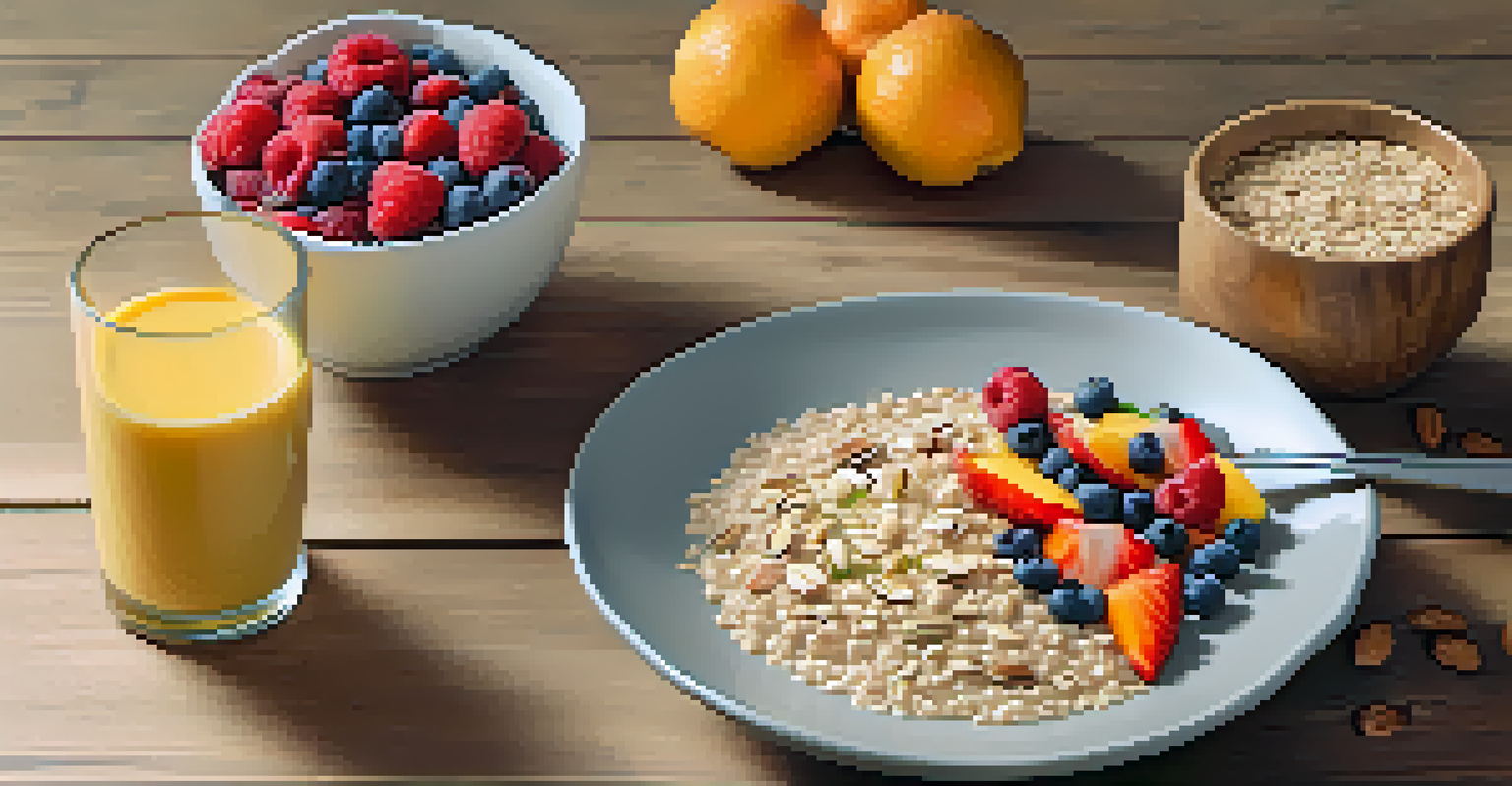Timing Your Meals: Performance Nutrition for Martial Artists

Understanding Performance Nutrition for Martial Artists
Performance nutrition is all about fueling your body to achieve peak results, especially in demanding sports like martial arts. It focuses not just on what you eat, but when you eat, influencing everything from energy levels to recovery. A balanced approach to meal timing can help martial artists maximize their training sessions and improve their overall performance.
Nutrition is not just about eating, it's about learning to live.
For martial artists, the right nutrition can mean the difference between a successful training session and feeling sluggish. This involves understanding how different foods affect your body based on timing, intensity, and duration of your workouts. By optimizing meal timing, you can ensure your body is always ready to perform, whether it's during practice or a competition.
Incorporating performance nutrition into your routine doesn’t have to be complicated. It's about listening to your body and adjusting your meal times to align with your training schedule. Let’s explore the different aspects of meal timing that can propel your martial arts journey forward.
Key Nutrients for Martial Artists: Fuel Your Body Right
To perform at your best, understanding key nutrients is essential. Carbohydrates, proteins, and fats all play crucial roles in providing energy and supporting muscle recovery. For martial artists, a balanced intake of these nutrients can enhance endurance, strength, and overall performance on the mat.

Carbohydrates are your primary source of energy, especially for high-intensity training. They help replenish glycogen stores, which are vital for sustained performance. Incorporating whole grains, fruits, and vegetables into your diet can ensure you have the energy needed for those rigorous training sessions.
Fuel Up for Optimal Performance
Understanding key nutrients like carbohydrates, proteins, and fats is essential for martial artists to enhance their energy and recovery.
Proteins, on the other hand, are essential for muscle repair and growth. Including lean meats, fish, and plant-based proteins in your meals can help your body recover faster after workouts. Healthy fats also play a role in hormone production and overall health, so don’t forget to include sources like nuts, seeds, and avocados in your diet.
The Importance of Pre-Workout Nutrition for Martial Artists
Pre-workout nutrition sets the stage for your performance, preparing your body for the demands of martial arts. Consuming the right foods at the right time can significantly impact your energy levels, endurance, and focus during training. Ideally, you should eat a balanced meal containing carbohydrates and protein about 2-3 hours before your workout.
You are what you eat, so don’t be fast, cheap, easy, or fake.
If you're short on time, a quick snack 30-60 minutes before training can also work wonders. Foods like a banana with peanut butter or a small smoothie can provide a quick energy boost without weighing you down. The key is to find what works best for you and helps you feel energized and ready to tackle your training.
Remember, everyone's body is different, so experimenting with meal timing and food choices is essential. Pay attention to how you feel during workouts to fine-tune your pre-workout nutrition strategy for optimal performance.
Post-Workout Nutrition: The Key to Recovery
The post-workout meal is crucial for recovery, helping your body repair and rebuild after the physical demands of martial arts training. Ideally, you should consume a meal or snack rich in protein and carbohydrates within 30-60 minutes after your workout. This helps replenish glycogen stores and kickstarts muscle recovery.
For example, a smoothie with protein powder, fruits, and spinach can be a quick and effective recovery option. Alternatively, a chicken wrap with whole grain bread and veggies can provide the nutrients your body needs to recover effectively. The goal is to nourish your body to reduce soreness and fatigue post-training.
Master Meal Timing Strategies
Effective meal timing, tailored to training intensity, can significantly impact energy levels and overall performance in martial arts.
Hydration also plays a vital role in recovery, so make sure to drink plenty of water after your workout. Proper post-workout nutrition not only aids recovery but also prepares you for your next training session, keeping you at the top of your game.
Hydration and Its Role in Martial Arts Performance
Hydration is often overlooked but is a critical component of performance nutrition for martial artists. Staying well-hydrated helps maintain energy levels and supports overall bodily functions, which is essential during intense workouts. Aim to drink water consistently throughout the day, not just before or after training.
During training sessions, especially those lasting over an hour, consider incorporating electrolyte-rich drinks to replenish lost minerals. This can help prevent fatigue and maintain optimal performance levels. It’s important to listen to your body and drink when you're thirsty, but also be proactive in your hydration strategy.
Remember, dehydration can lead to decreased performance, increased risk of injury, and longer recovery times. Make hydration a priority in your daily routine and see how it positively impacts your martial arts training.
Meal Timing for Different Training Intensities
Not all training sessions are created equal, and your meal timing should reflect the intensity of your workouts. For high-intensity sessions, having a solid pre-workout meal is even more crucial to fuel your body adequately. Conversely, lighter training days may allow for more flexibility in your meal timing and choices.
On days when you're focusing on technique or lighter drills, you might not need a large meal beforehand. A light snack can suffice, allowing you to maintain energy without feeling weighed down. However, after intense training, it's vital to prioritize a nourishing post-workout meal to aid recovery.
Hydration Is a Must
Staying properly hydrated is crucial for maintaining energy and supporting recovery during intense martial arts training sessions.
By tailoring your meal timing to match your training intensity, you can optimize your energy levels and performance. It’s all about finding the right balance that works for your unique training regimen.
Listening to Your Body: Personalizing Meal Timing
Ultimately, the best guide for meal timing is your body. Everyone’s needs are different, and what works for one person may not work for another. Pay attention to how you feel during training and adjust your meal timing accordingly to find what optimizes your performance.
Keeping a food and training journal can be a helpful tool in this process. Record what you eat, when you eat it, and how you feel during your workouts. Over time, you'll begin to see patterns that can guide your meal timing decisions.

Don’t hesitate to experiment with different foods and timings to see what makes you feel your best. Personalizing your nutrition strategy can lead to improved performance and a more enjoyable training experience.